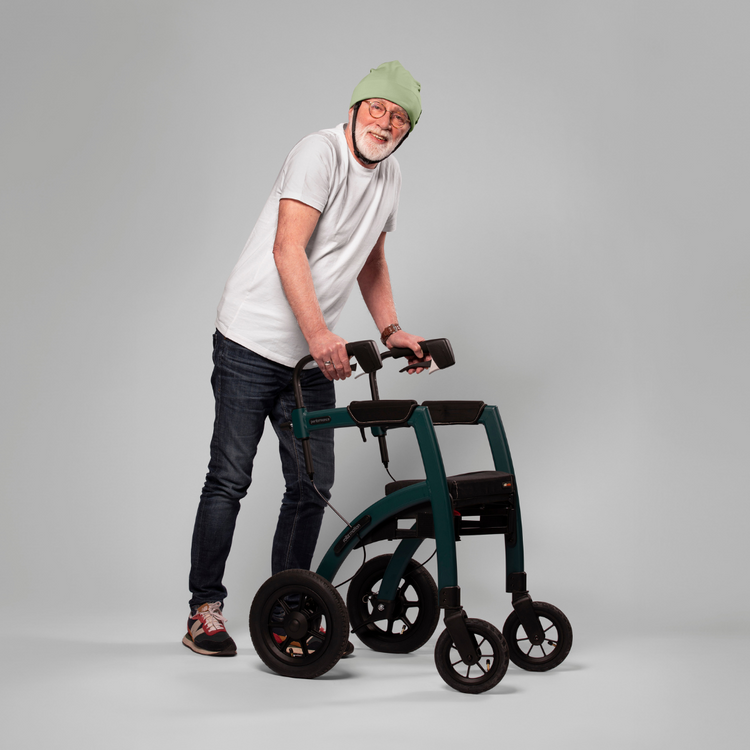Discover the joy and benefits of an active lifestyle with our guide for seniors. Learn about the benefits of exercise and discover practical tips for incorporating daily activities and hobbies into your routine. Discover how assistive devices can safely increase your mobility and independence.
Exercise is good for everyone and there is no age limit. It has been proven that active seniors sleep better, have a stronger immune system and enjoy a better quality of life. And believe us: the people around you will really notice that. Because those who stay active are more comfortable and feel happier.
The benefits of sufficient exercise
Research has shown that sufficient exercise has many beneficial effects. These effects increase the more you exercise. This section discusses the positive effects of exercise in detail.
Gives energy: you feel fulfilled when you use your body and brain. This is because the substance endorphins are released in the brain during exercise. This substance, also called the happiness hormone, makes you feel better, more relaxed, feel satisfied and experience a reduction in stress, anxiety and depression.
Improved physical health: regular exercise is one of the best ways to become healthier. It is good for your heart, blood vessels and lungs. It also reduces the risk of chronic diseases such as cardiovascular disease, type 2 diabetes and cancer. It also reduces the risk of bone fractures and improves walking ability and muscle strength.
Stimulates the brain: exercise is good for your memory, concentration and how quickly you process information. This is thought to be because exercise stimulates the heart and blood vessels, and the brain is an organ with many blood vessels.
Improves daily life: housework, cooking, gardening, getting groceries are more difficult tasks for many people in old age. Exercise improves muscle strength, walking ability and is less likely to fall.
Provides social contact: when you exercise in groups, you increase and/or maintain your social contacts. For many, exercising in groups contributes to the enjoyment of exercise. This social interaction contributes to a sense of belonging and can help combat loneliness.
Better quality of life: an active lifestyle enables you to do activities you enjoy and to carry them out independently. This leads to a happier and more fulfilling life.
Tips to maintain an active lifestyle
There are many activities that can help you maintain an active lifestyle. By applying these activities to your life, you will preserve an active lifestyle and enjoy a healthier and happier life as a senior.
Daily activities: cooking, working in the garden, running errands, cleaning or going to the market will keep you moving.
Take time for the things you love: identify what you enjoy and invest in these activities. Plan a trip to the park or the city, explore new locations and participate in new activities such as an exhibition or a local event.
Volunteer: you can also volunteer at a hospital, a school, a food bank or an animal shelter. In addition, you can also help at events in the neighborhood. This way you contribute to the community, are active and get in touch with others.
Sports: swimming, hiking, biking, dancing, golf are popular sports among the elderly. You can always do these sports in groups as well. Some gyms also offer group classes for seniors. So look for a sports club near you to join.
Hobbies: find a hobby you enjoy and make time for it. For example, you may have a passion for flower arranging and you can go to a weekly workshop. During this workshop you are moving and your brain is actively working. Join a club, get in touch with (new) people and learn new skills.
Associations: you can also join an association. For example, there are a lot of walking and cycling groups. There are also reading clubs, cooking clubs and craft groups.
Keep learning: train your brain by solving puzzles or riddles. Also stay mentally active by reading a book, playing a board game, immersing yourself in a new course, participating in quizzes or playing a musical instrument.
Tools that help and protect you with an active lifestyle
Of course, a lot of risks come with an active lifestyle as a senior. You get a little older every day, and the risk of falling remains. There are plenty of aids you can use as a senior to maintain your active lifestyle and independence.
For example, canes can maintain balance and reduce the risk of falling. Walkers or rollators also provide support and stability for seniors. Rollz is known for its quality rollators that combine functionality and style. Seniors can enjoy an active lifestyle with comfort and convenience with Rollz. With these rollators, you can move daily, be independent and improve your mobility. In addition, a senior alarm is a great tool for seniors who live alone. These fall alarms are worn on the wrist allowing users to quickly summon help in case of an emergency. Finally, safe and comfortable clothing are also a must for your active lifestyle: shoes with non-slip soles provide extra grip and can prevent slipping. And our fashionable protective Ribcap helmets have breathability and are light, allowing you to wear this protective helmet comfortably for an entire day.
In summary, an active lifestyle for seniors is essential for better physical and mental health. Engaging in hobbies and sports, joining a club or volunteer club, continuing to learn and investing time in the things you enjoy doing promote an active lifestyle. With various medical devices, you can protect yourself if you live an active lifestyle and are at risk of injury.
Want to be featured on our blog? Tell us your story, get in touch or tag us on social media.
Written by Nico De Wilde



